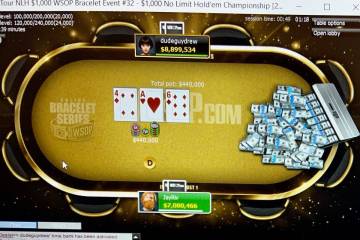Crumbled buildings, cannons symbolize current status of Macau
Visitors to Macau can capture spectacular images of the city’s downtown peninsula skyline from the Ruins of St. Paul, a hillside area that includes the stone facade remnants of a 16th century cathedral.
Above the church site is Mount Fortress, which was built by Jesuits to protect the Portuguese colony. The historic fort’s cannons point toward Macau and the peninsula area’s casinos, the most prominent being the Grand Lisboa, with its hotel tower in the shape of a giant lotus flower.
These images of crumbled buildings and cannons serve as a metaphor for the current state of the Chinese gaming enclave.
Even after six consecutive monthly gaming revenue declines, Macau is still not close to hitting bottom.
It’s already established that Macau will suffer its first-ever annual gaming revenue decline in 2014.
Some analysts believe the December numbers could eclipse October’s 23.2 percent gaming revenue drop, the largest single-month decline since American-owned casinos began operating in Macau in 2004.
What a difference a year makes.
“This clearly was a different trip than what we’ve become accustomed to over the past eight years visiting this market,” Stifel Nicolaus Capital Markets gaming analyst Steven Wieczynski said in a report after visiting Macau this month.
“In years past, sentiment on the market was overly bullish and it seemed like Macau would never slow,” Wieczynski said. “This trip, however, we saw a much different attitude from operators with more uncertainty about the market moving forward.”
Other analysts toured Macau this month and came away with similar opinions.
Macau’s casino industry has suffered since June. A crackdown on corruption by the Chinese government has placed a focus on junket operators. The junkets bring high-end baccarat gamblers to the casino’s ultraexclusive private gambling rooms.
Those junket operators have been linked to Chinese organized crime triads.
The South China Post in Hong Kong this month reported that police froze the assets of one junket operator who was tied to money laundering by a former Chinese soccer club owner.
The crackdown has scared away high-end business, which was largely responsible for Macau’s record $45.2 billion gaming revenue total in 2013. The 35 casinos in Macau will report a smaller figure this year; how much depends on December’s results.
Casino operators might be in need of Prozac or some other antidepressants.
“The (analyst) meetings were generally downbeat but consistent with the recent downward operating trends the market has experienced in recent months,” J.P. Morgan gaming analyst Joe Greff said. “Conversations that were centered on how much the market could grow have shifted to guessing when the decline and impact from Mainland China’s anti-corruption campaign will cease.”
Most analysts and casino operators are watching for positive signals during this week’s visit to Macau by China President Xi Jinping, who is marking the 15th anniversary of the handover of Macau by Portugal.
Before becoming president, Xi headed Beijing’s advisory team on the public affairs of Hong Kong and Macau, both of which are operated as Special Administrative Regions of China.
The Chinese president also has been vocal about wanting Macau to be less reliant on gaming. About two-thirds of the government’s revenue comes from gaming taxes.
Wells Fargo Securities gaming analyst Cameron McKnight said the president’s visit will further pressure Macau casinos by driving down business.
The focus in the U.S. is on the three Nevada companies that operate casinos in Macau — Wynn Resorts Ltd., Las Vegas Sands Corp., and MGM Resorts International.
Wynn and Sands collect 65 percent to 75 percent of their annual revenue and cash flow from their Macau holdings. MGM Resorts is less dependent on Macau. The company is far more focused on the Strip, where it operates 10 resorts, including the CityCenter complex.
“Panic has set in. Investors are running for the hills given the uncertainty over the near-term,” Wieczynski said.
Still, all three companies are moving forward with their new developments on Macau’s Cotai Strip region: Las Vegas Sands’ $2.7 billion Parisian, Wynn’s $4 billion Wynn Palace and the $2.9 billion MGM Cotai.
Other Macau casino operators have Cotai projects under development, including Galaxy Entertainment’s expansion of the Galaxy resort and Melco’s Studio City complex.
Most observers predict the current Macau downturn will reverse itself sometime next year.
“The real question though, which we still don’t believe anyone has an answer, is when/if the VIP market will grow again or for that matter, stabilize,” Wieczynski said.
Howard Stutz’s Inside Gaming column appears Wednesdays and Sundays. He can be reached at hstutz@reviewjournal.com or 702-477-3871. Find on Twitter: @howardstutz.




























